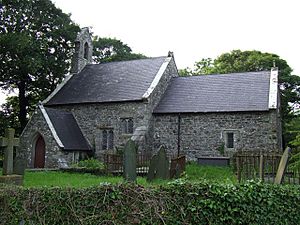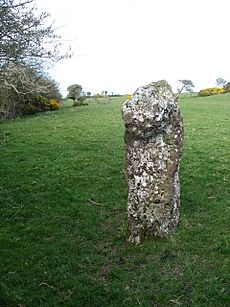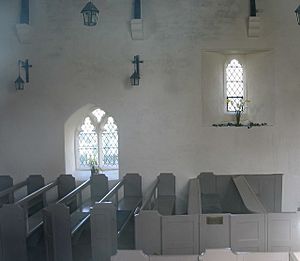St Tyfrydog's Church, Llandyfrydog facts for kids
Quick facts for kids St Tyfrydog's Church, Llandyfrydog |
|
|---|---|

The south side of the church. The nave and porch are on the left, and the chancel is on the right.
|
|
| Lua error in Module:Location_map at line 420: attempt to index field 'wikibase' (a nil value). | |
| OS grid reference | SH 443 853 |
| Location | Llandyfrydog, Anglesey |
| Country | Wales, United Kingdom |
| Denomination | Church in Wales |
| History | |
| Status | Church |
| Founded | c.450 (original church) Oldest parts of current church date from c.1400 |
| Founder(s) | St Tyfrydog |
| Dedication | St Tyfrydog |
| Architecture | |
| Functional status | Active |
| Heritage designation | Grade II* |
| Designated | 12 May 1970 |
| Style | Medieval |
| Specifications | |
| Length | 24 ft 9 in (7.5 m) (nave) |
| Nave width | 23 ft 6 in (7.2 m) |
| Administration | |
| Parish | Amlwch |
| Deanery | Twycelyn |
| Archdeaconry | Bangor |
| Diocese | Diocese of Bangor |
| Province | Province of Wales |
St Tyfrydog's Church is a small church from the Middle Ages located in the village of Llandyfrydog, on the island of Anglesey in north Wales. No one knows for sure when the first church was built here, but some historians believe it was around the year 450.
The oldest parts of the church you can see today were built around 1400. These include the main body of the church, called the nave, and the arch leading to the chancel (the area around the altar). The church is built from rough, squarish stones.
The church is linked to some interesting local legends. One story tells of a man who stole a Bible from the church and was turned to stone by the church's founder, St Tyfrydog. Another tale, told by the historian Gerald of Wales, says that a Norman lord named Hugh of Montgomery kept his dogs in the church in 1098. By the next morning, the dogs had gone mad, and Hugh himself was killed less than a week later.
Today, St Tyfrydog's is still an active church and part of the Church in Wales. It is a Grade II* listed building, which means it is considered a "particularly important building of more than special interest" and is protected because of its long history.
Contents
History and Location
Where is the Church?
St Tyfrydog's Church is found in a peaceful, wooded churchyard in the small village of Llandyfrydog. The village is about six miles from Llangefni, the main town in Anglesey. The name Llandyfrydog comes from the church itself. In Welsh, llan means "enclosure" or "church," and "dyfrydog" is a form of the saint's name, Tyfrydog.
A church was first said to have been built on this site around 450 by St Tyfrydog. While the building we see today is much newer, its history goes back hundreds of years. The church was mentioned in records from 1254. It was partly rebuilt and restored several times, including in 1823 and 1862. During the 1862 restoration, the porch and a small room called a vestry were added.
Legends of the Church
The church is famous for its local stories. About a mile away from the village, there is a standing stone that is about 4 feet tall. It is known as "the thief of Dyfrydog." Local tradition says that this stone is actually a man who was turned into stone by St Tyfrydog as a punishment for stealing the church's Bible. A lump near the top of the stone is said to be the sack the man was carrying on his shoulder.
Another story comes from the famous Welsh historian Gerald of Wales. In 1191, he wrote that a Norman lord, Hugh of Montgomery, used the church as a kennel for his dogs while fighting a Welsh revolt in 1098. The next day, the dogs had gone mad. A week later, Hugh was killed in battle.
Architecture and Design
St Tyfrydog's Church is built from rough, squared stones with limestone details. The main part of the church, the nave, is almost a square. The roof is made of slate and has a small stone tower called a bellcote on the west end, which holds a single bell.
Windows and Interior
The church has several interesting windows. The oldest one, on the south wall, dates back to about 1400. It has two sections, called lights, with decorative clover-leaf shapes (trefoils) at the top. Another window on the same wall was placed higher up to let more light onto the pulpit, the raised platform where sermons are given.
The east window, behind the altar, is from the late 1400s and is the only one with stained glass. Inside, a pointed arch from around 1400 separates the nave from the chancel. The seating is made up of painted wooden box pews, which were likely added during the 1823 restoration.
Special Features
A survey in 1937 noted some special items in the church. These included a communion table from the 1700s, a silver cup from the time of Queen Elizabeth I, and a silver plate, or paten, dated 1721.
One old seat near the altar was marked with "R.B. 1630." This is thought to show that the seat belonged to the Bulkeley family, who were very powerful landowners in north Wales for centuries. In the churchyard, there is a sundial from the 18th century that stands on the base of an old stone cross.
Why is the Church Important?
St Tyfrydog's Church is protected as a Grade II* listed building. This is the second-highest level of protection for historic buildings in Wales. It was given this status on May 12, 1970, because it is a great example of a medieval country church that has kept much of its original structure.
The organization responsible for protecting Welsh heritage, Cadw, also noted that the church has a "rich vernacular character," meaning it has a simple, traditional style that reflects the local area. The stone wall around the churchyard and the 18th-century sundial are also protected as Grade II listed structures.
Historians have praised the church's design. In 1859, the writer Harry Longueville Jones called it "one of the better sort" of churches in Anglesey. He noted that the high walls of the chancel gave the inside of the church a grand feeling. A modern guide from 2009 called it a "handsomely proportioned church."
 | Ernest Everett Just |
 | Mary Jackson |
 | Emmett Chappelle |
 | Marie Maynard Daly |



